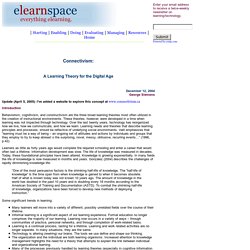

Effective Practice in a Digital Age. Learning design and assessment with e-tivities. 3E Framework. The use of technology to enhance learning, teaching and assessment is a key aspect of the staff and student experience at Edinburgh Napier.

Beyond the now well-established use of the University’s virtual learning environment, a rich range of new and currently emerging technologies are being effectively used to support learning, teaching and assessment in classroom, blended, and online contexts. The underlying principle of the University benchmark is that all modules can adopt technology to effectively benefit some aspect of the learning, teaching and assessment experience. The University benchmark for the use of technology in modules, which you can find here, is therefore designed to help academic staff to consider new or further developed uses of technology that are appropriate for the contexts within which they teach.
Authors and acknowledgements >> This work is licensed under aCreative Commons Attribution-NonCommercial-ShareAlike 2.5 UK: Scotland License. Problem-Based Learning. Connectivism: A Learning Theory for the Digital Age. Connectivism: A Learning Theory for the Digital Age December 12, 2004 George Siemens Update (April 5, 2005): I've added a website to explore this concept at www.connectivism.ca Introduction Behaviorism, cognitivism, and constructivism are the three broad learning theories most often utilized in the creation of instructional environments.

Learners as little as forty years ago would complete the required schooling and enter a career that would often last a lifetime. “One of the most persuasive factors is the shrinking half-life of knowledge. Some significant trends in learning: Many learners will move into a variety of different, possibly unrelated fields over the course of their lifetime.
Background Driscoll (2000) defines learning as “a persisting change in human performance or performance potential…[which] must come about as a result of the learner’s experience and interaction with the world” (p.11). Driscoll (2000, p14-17) explores some of the complexities of defining learning. Conclusion: EDUapps inclusive software collections MyStudyBar « What is MyStudyBar?

New version released : Go to the Download page to get the latest version of MyStudyBar MyStudyBar is a tool which helps overcome problems that students commonly experience with studying, reading and writing. The tool consists of a set of portable open source and freeware applications, assembled into one convenient package. Easy to install, simple to use, handy and effective, MyStudyBar provides comprehensive learning support at the desktop, where it is needed. And if this is not already attractive enough, a further eye-catching feature of MyStudyBar is that it is completely FREE to download and free to use. Although MyStudyBar is designed to support learners with literacy-related difficulties such as dyslexia, the toolbar can offer potential benefits to all learners. Features of MyStudyBar MyStudyBar puts a whole range of individual and essential tools at your fingertips. Sir Jackie Stewart endorses MyStudyBar MyStudyBar step-by-step guides Introduction to MyStudyBar.
Learning to Teach Inclusively. We have placed cookies on your computer to help make this website better.

For more information on cookies visit www.wlv.ac.uk/cookies to change your settings. Otherwise, we'll assume you're OK to continue. <div>Browser does not support script. </div> Contact Us Address Centre for Academic Practice University of Wolverhampton Wulfruna St Wolverhampton WV1 1LY Telephone Email M.J.Lawton@wlv.ac.uk Learning to Teach Inclusively Project Leader: Professor Christine Hockings Email: C.Hockings@wlv.ac.uk This project is jointly supported by JISC and the HEA under the Open Educational Resources Programme.
OER Module Learning to Teach Inclusively module Learning to Teach Inclusively online module and download options.Learning to Teach Inclusively Mobile web app The module is now available as a mobile app. Project Overview Learning to Teach Inclusively – a multi media open access module for HE staff Inclusive Curriculum Design and AssessmentInclusive PedagogyManaging and Researching the Inclusive Institution. OcTEL-Week-2.